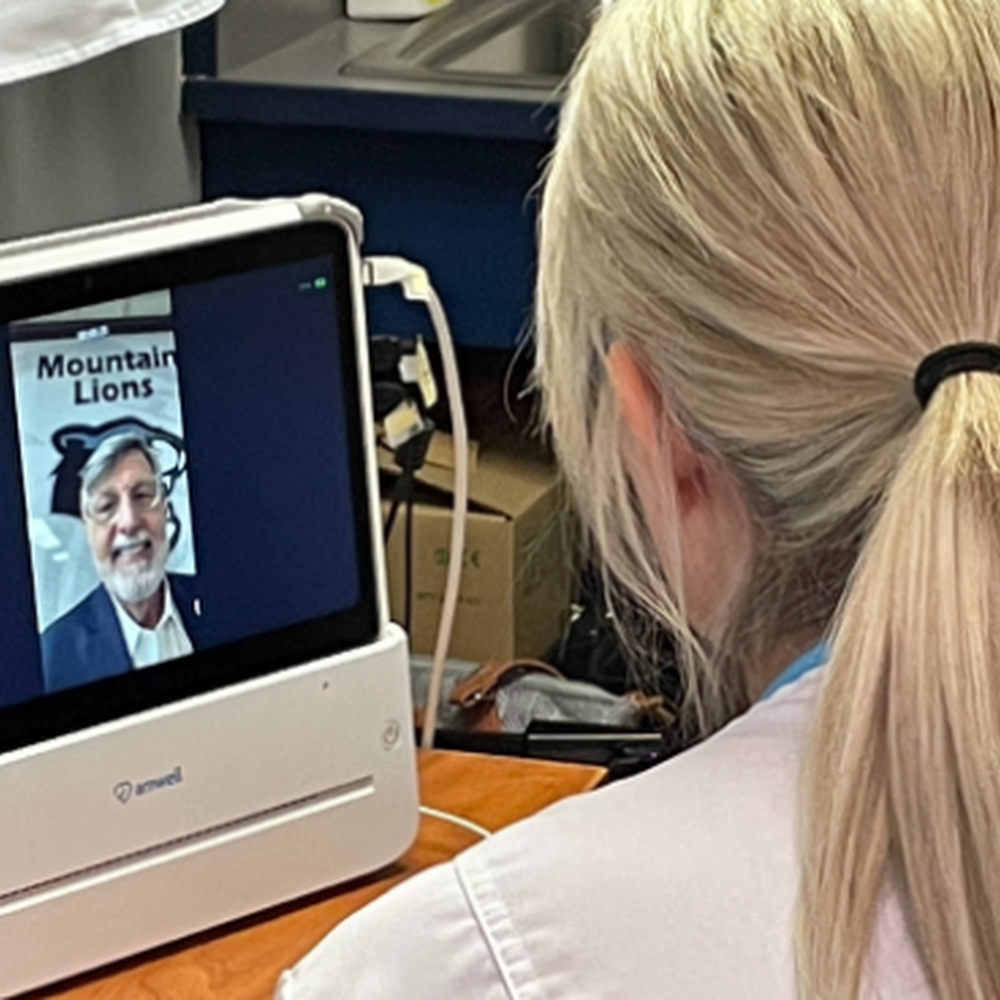In a telehealth clinic, the student is first assessed by a telepresenter on-site. If a visit with a provider is needed, the telepresenter creates a virtual visit to bring together the child, the parents, a translator if necessary, and the pediatrician or other provider. The telepresenter operates specialized equipment that allows the off-site provider to examine the ears, eyes, nose, throat, skin, and hair, and to listen to the heart and lungs in high fidelity and in real time while discussing the plan of care directly with the patient and parents.
“You have to have good clinical assessment skills and be comfortable making decisions on your own,” says Kim Gordon, an LPN with 25 years of experience who has been the telepresenter at the Bessemer Elementary clinic since it opened. “Essentially you are the eyes, ears, and hands for the physician to be able to do a virtual visit.”
In addition to the technology aspects, Dr. Jenkins says one of the most important parts of the telepresenter’s role is the ongoing connection they have with the family: “providing that teach-back opportunity for parents, making sure that there’s follow-up, and that the care plan the provider created is understood and followed.”
While the technology and the setting might be uncharted territory for many potential telepresenters, “the beautiful part is that the patient-centered care has stayed the same,” says Terry Lynn, Greensboro AHEC’s Director of Medical Education. “It’s just the way that you do the work that’s different.” Gordon trained for months on the technology with Dr. Jenkins and now will be training an additional telepresenter who will serve the students at Cone Elementary. “She took a chance on this new project that we were launching, learned about it, and now she’s teaching others and serving as a resource on telepresenting,” Lynn says.
School-based telehealth providers throughout North and South Carolina will have the opportunity to learn from each other in a new Carolina School Based Telehealth Learning Collaborative. “When we looked at all the different efforts in North and South Carolina, we saw that there was a lot of learning that, if shared, could have helped people to advance their programs more efficiently, more effectively, and more rapidly to the communities they serve,” Dr. Jenkins says. The Collaborative, which also receives grant support from the Duke Endowment, will facilitate that sharing and will collect data and assess outcomes for the purpose of identifying and then distributing best practices.
“We’re partnering with Greensboro AHEC Practice Support to build an understanding of the critical role that regional AHECs can play in helping school-based telehealth programs grow and spread in the areas of the Carolinas where members of the Collaborative are delivering health care,” Dr. Jenkins says.
His own passion for school-based telehealth stems partly from a short period working as a teacher very early in his career. “I worked in schools for five years and completed a master’s degree in education, and I really enjoyed and developed a passion for students and the needs of students that has kind of stuck with me,” he says. Years later, he worked in lean practice improvement, which led to an interest in telehealth. “It’s really a wonderful medium to provide efficient, on-demand care so that people can have the care that they need, when they need it, in a way that’s good for them, delivered to them where they are, rather than mandating they come to where we are. It eliminates a lot of waste and a lot of the burden on the family.”
In her time working in the school setting, Gordon has gained a similar passion. Her biggest takeaway from the past year has been the realization of how many children lack access to good healthcare. “I knew that there was a need for it in the school system, but before this role, I did not realize how great the need was,” she says.
“The most rewarding part of my job is seeing the kids’ smiling faces once they have had a visit with the physician or have seen me,” Gordon says. “They know they can count on someone being there to take care of them medically, and that brings me joy every day.”
For more information about Greensboro AHEC Practice Support, please contact Suzanne Lineberry.

